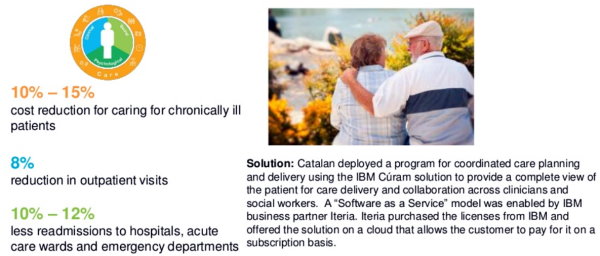Can Big Data really impact healthcare costs and improve the lives of patients? At a roundtable event held by the IBM Curam Research Institute in Boston, MA last week, Rory O’Connor made a presentation about IBM Care Management, which is the first business solution from IBM Watson Health. The program included information about a collaboration with the Catalan Institute of Health, which is a major health provider in Catalonia, Spain. The organization faces some significant challenges. One out of four citizens is over 65 years old, and nearly two-thirds of them have one or more chronic disease. This portion of the population accounts for $.70 of every dollar spent on healthcare resources.
The organization created a program that coordinated the healthcare planning and delivery based on IBM’s services. The system brings together data from a wide variety of sources, including electronic health records (EHR), pharmacy records, insurance claims, and remote patient monitoring including wearable Health Tech devices. Unstructured data and clinical notes are integrated into the system, and some of the content is automatically identified by the system including information about diagnosis, treatment, allergies, and lab results. This data is then used to assemble a support and care team for each patient, and reports help monitor their health and treatment.
The results? According to the presentation, the Catalan group has seen a 10% to 15% reduction in the cost of caring for patients with chronic illnesses. There has been an 8% reduction in outpatient visits, and a 10% to 12% reduction in expensive hospital readmissions. At the same time, patient satisfaction and quality of care has increased while the number of errors due to miscommunication have declined. Lower costs, better outcomes: the Big Data benefits of digital healthcare appear to be real.



Trackbacks/Pingbacks